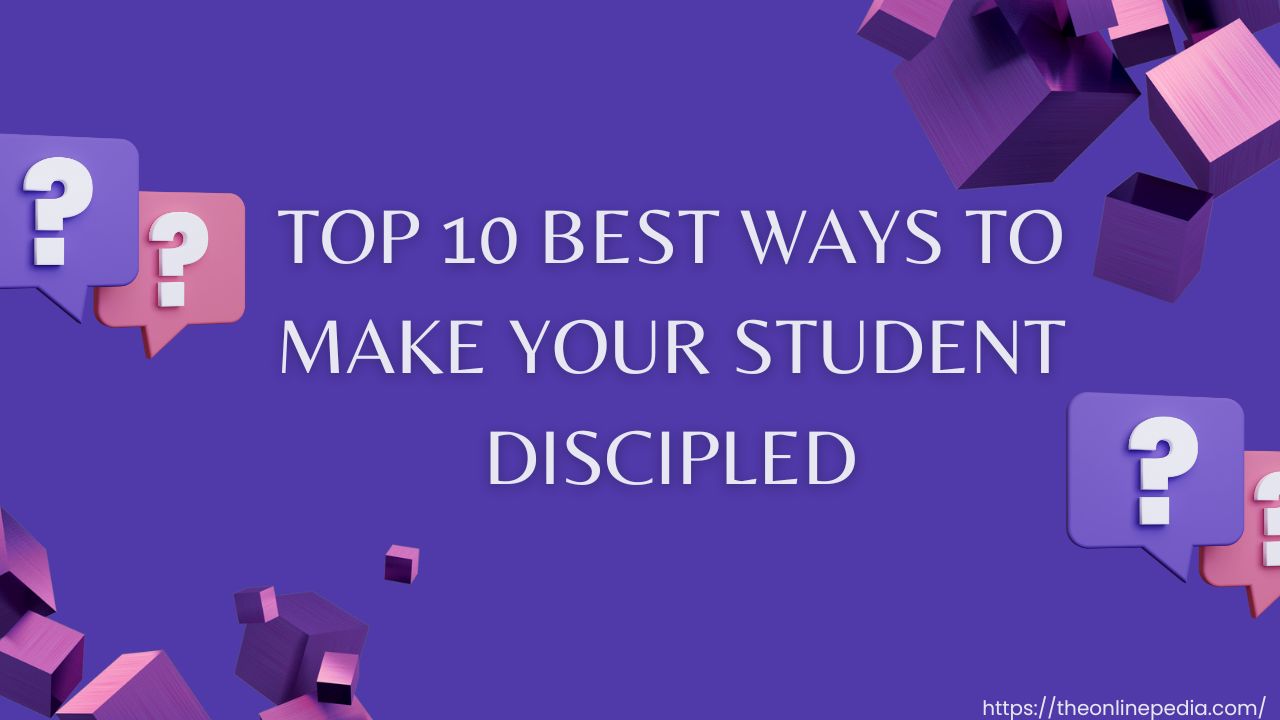Top 10 Best Ways to Make Your Student discipled, In the world of education, discipline means teaching students to follow rules and regulations. Schools establish codes of conduct to create a disciplined learning environment. Some schools even use punishment for disobedience.
Why Discipline Matters?
Discipline plays a vital role in a student’s life. It paves the way for success by removing obstacles. Schools like those in Dehradun set strict discipline codes to nurture a healthy atmosphere. Discipline acts as the bridge between goals and achievements.
Enhancing Classroom Learning
Discipline is crucial for a conducive learning environment. Students following rules focus on acquiring knowledge, whereas without discipline, chaos reigns. Disorderly conduct not only hinders individual progress but also disrupts others who are eager to learn.
The Ongoing Effort to Improve Discipline
Schools continually seek ways to enhance discipline. Early exposure to discipline is essential as it prepares children for life’s rules. Discipline extends its influence beyond the classroom, contributing positively to societal development and shaping young minds.
Top 10 Best Ways to Make Your Student discipled
1. Effective Planning and Organization
Teachers can maintain discipline by planning lessons and ensuring materials are ready. This prevents delays and keeps students focused on learning.
2. Addressing Issues Promptly
Promptly addressing minor issues shows students they are valued. It encourages them to maintain discipline. Ignoring problems can lead to bigger disruptions.
3. Striking the Right Balance with Rules
Balancing rules and regulations is crucial. Too few rules lead to a lack of discipline, while too many can frustrate students. Schools should have rules that are necessary and remove unnecessary ones.
4. Explain Rules Clearly
Students should understand school rules. Teachers should take time to explain them, setting clear boundaries and helping students develop discipline over time.
Also Read:
How to Make Student Life Enjoyable?
7 Important Factors to Consider When Choosing a Career
How to Achieve Success in Life?
How to Write an Essay on Importance of Online Education Essay 500 Words?
5. Lead by Example
Everyone in the school community, including teachers and staff, should follow the rules. This sets an example for students to follow.
6. Interactive Classrooms
Engage students with educational technology, gamified lessons, or multimedia to make learning interactive and captivating.
7. Active Classroom Presence
Teachers moving around the class can make mischievous students uneasy. It ensures that students, even those at the back, behave well as they feel under supervision.
8. Rewarding Good Behavior
Recognizing well-disciplined students encourages others to behave better. Teachers can plan rewards for students displaying good behavior.
9. Maintaining Professionalism
While building rapport with students is important, teachers should maintain professionalism. Being a mentor rather than just a friend helps guide students towards discipline and higher goals.
10. Cultivating Positivity
Teachers should foster a positive environment where students feel comfortable expressing themselves. A positive attitude helps instill discipline in the classroom.
What Makes a Student Disciplined?
Discipline in students is characterized by several key attributes:
- Self-Control: Disciplined students can control their impulses and emotions, enabling them to focus on tasks and follow rules.
- Responsibility: They take responsibility for their actions and are accountable for their behavior in a learning environment.
- Respect: Disciplined students respect their teachers, peers, and the learning process. They understand the importance of a respectful classroom atmosphere.
- Adherence to Rules: They consistently follow classroom and school rules, understanding that these rules contribute to a conducive learning environment.
- Focus on Learning: Disciplined students prioritize learning over distractions, demonstrating a commitment to their education.
5 Effective Disciplinary Interventions
When faced with discipline challenges, these five effective disciplinary interventions can be helpful:
- Verbal Warning: Start with a verbal warning, privately discussing the student’s behavior and the consequences if it continues.
- Time-Out: Temporarily remove the student from the classroom to provide an opportunity for reflection and calm down.
- Loss of Privileges: Restrict privileges such as recess or using certain classroom resources until the student demonstrates improved behavior.
- Parent Involvement: Communicate with the student’s parents or guardians to discuss the behavior and collaborate on a solution.
- Behavioral Contracts: Develop a behavioral contract with the student outlining expectations and rewards for improved behavior.

